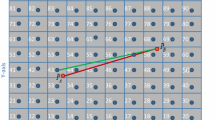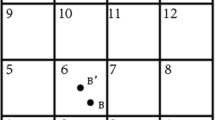Abstract
Secure Two-Party Distance Computation is an important primitive of Secure Multiparty Computational Geometry that it involves two parties, where each party has a private point, and the two parties want to jointly compute the distance between their points without revealing anything about their respective private information. Secure Two-Party Distance Computation has very important and potential applications in settings of high secure requirements, such as privacy-preserving Determination of Spatial Location-Relation, Determination of Polygons Similarity, and so on. In this paper, we present a quantum protocol for Secure Two-Party Distance Computation by using QKD-based Quantum Private Query. The security of the protocol is based on the physical principles of quantum mechanics, instead of difficulty assumptions, and therefore, it can ensure higher security than the classical related protocols.

Similar content being viewed by others
Explore related subjects
Discover the latest articles, news and stories from top researchers in related subjects.References
Yao, A.C.: Protocols for secure computations. In: Proceedings of 23rd Annual Symposium on Foundations of Computer Science, Chicago, USA, pp. 160–164. IEEE Computer Society Press, New York (1982)
Goldwasser, S.: Multi party computations: past and present. In: Proceedings of the 16th Annual ACM Symposium on Principles of Distributed Computing, pp. 1–6, New York (1997)
Atallah, M.J., Du, W.: Secure multi-party computational geometry. In: Proceedings of 7th International Workshop on Algorithms and Data Structures, pp. 165–179. Springer, Berlin Heidelberg (2001)
Frikken, K.B., Atallah, M.J.: Privacy preserving route planning. In: Proceedings of the 2004 ACM Workshop on Privacy in the Electronic Society, pp. 8–15. ACM, New York (2004)
Li, S.D., Dai, Y.Q.: Secure two-party computational geometry. J. Comput. Sci. Technol. 20(2), 258–263 (2005)
Luo, Y.L., Huang, L.S., Zhong, H.: Secure two-party point-circle inclusion problem. J. Comput. Sci. Technol. 22(1), 88–91 (2007)
Yang, B., Sun, A., Zhang, W.: Secure two-party protocols on planar circles. J. Inf. Comput. Sci. 8(1), 29–40 (2011)
Huang, H., Gong, T., Chen, P., et al.: Secure two-party distance computation protocols with a semihonest third party and randomization for privacy protection in wireless sensor networks. Int. J. Distrib. Sens. Netw. 11(7), 475150 (2015)
Huang, H., Gong, T., Chen, P., et al.: Secure two-party distance computation protocol based on privacy homomorphism and scalar product in wireless sensor networks. Tsinghua Sci. Technol. 21(4), 385–396 (2016)
Shor, P.W.: Algorithms for quantum computation: discrete logarithms and factoring. In: Proceedings of 35th Annual Symposium on Foundations of Computer Science, Santa Fe, New Mexico, pp. 124–134. IEEE, New York (1994)
Grover, L.K.: A fast quantum mechanical algorithm for database search. In: Proceedings of the 28th Annual ACM Symposium on Theory of Computing, Coimbra, Portugal, pp. 212–219. ACM, New York (1996)
Chor, B., Goldreich, O., Kushilevitz, E., Sudan, M.: Private information retrieval. In: Proceedings of the 36th Annual IEEE Symposium on Foundations of Computer Science (FOCS 1995), pp. 41–50 (1995)
Chor, B., Goldreich, O., Kushilevitz, E., Sudan, M.: Private information retrieval. J. ACM 45, 41–50 (1998)
Gertner, Y., Ishai, Y., Kushilevitz, E., Malkin, T.: Protecting data privacy in private information retrieval schemes. J. Comput. Syst. Sci. 60, 592–629 (2000)
Lo, H.K.: Insecurity of quantum secure computations. Phys. Rev. A 56(2), 1154 (1997)
Colbeck, R.: Impossibility of secure two-party classical computation. Phys. Rev. A 76(6), 062308 (2007)
Buhrman, H., Christandl, M., Schaffner, C.: Complete insecurity of quantum protocols for classical two-party computation. Phys. Rev. Lett. 109(16), 160501 (2012)
Giovannetti, V., Lloyd, S., Maccone, L.: Quantum private queries. Phys. Rev. Lett. 100(23), 230502 (2008)
Olejnik, L.: Secure quantum private information retrieval using phase-encoded queries. Phys. Rev. A 84(2), 022313 (2011)
Jakobi, M., Simon, C., Gisin, N., et al.: Practical private database queries based on a quantum-key-distribution protocol. Phys. Rev. A 83(2), 022301 (2011)
Scarani, V., Acin, A., Ribordy, G., et al.: Quantum cryptography protocols robust against photon number splitting attacks for weak laser pulse implementations. Phys. Rev. Lett. 92(5), 057901 (2004)
Gao, F., Liu, B., Wen, Q.Y., et al.: Flexible quantum private queries based on quantum key distribution. Opt. Express 20(16), 17411–17420 (2012)
Zhang, J.L., Guo, F.Z., Gao, F., et al.: Private database queries based on counterfactual quantum key distribution. Phys. Rev. A 88(2), 022334 (2013)
Yang, Y.G., Sun, S.J., Xu, P., et al.: Flexible protocol for quantum private query based on B92 protocol. Quantum Inf. Process. 13(3), 805–813 (2014)
Yang, Y.G., Zhang, M.O., Yang, R.: Private database queries using one quantum state. Quantum Inf. Process. 14(3), 1017–1024 (2015)
Liu, B., Gao, F., Huang, W., et al.: QKD-based quantum private query without a failure probability. Sci. China Phys. Mech. Astron. 58(10), 100301 (2015)
Rao, M.V.P., Jakobi, M.: Towards communication-efficient quantum oblivious key distribution. Phys. Rev. A 87(1), 012331 (2013)
Gao, F., Liu, B., Huang, W., et al.: Postprocessing of the oblivious key in quantum private query. IEEE J. Sel. Top. Quantum Electron. 21(3), 98–108 (2015)
Yang, Y.G., Liu, Z.C., Chen, X.B., et al.: Novel classical post-processing for quantum key distribution-based quantum private query. Quantum Inf. Process. 15(9), 3833–3840 (2016)
Chan, P., Lucio-Martinez, I., Mo, X., et al.: Performing private database queries in a real-world environment using a quantum protocol. Sci. Rep. 4, 5233 (2014)
Sun, S.J., Yang, Y.G., Zhang, M.O.: Relativistic quantum private database queries. Quantum Inf. Process. 14(4), 1443–1450 (2015)
Wei, C.Y., Wang, T.Y., Gao, F.: Practical quantum private query with better performance in resisting joint-measurement attack. Phys. Rev. A 93(4), 042318 (2016)
Maitra, A., Paul, G., Roy, S.: Device-independent quantum private query. Phys. Rev. A 95(4), 042344 (2017)
Zhao, L.Y., Yin, Z.Q., Chen, W., et al.: Loss-tolerant measurement-device-independent quantum private queries. Sci. Rep. 7, 39733 (2017)
Acknowledgements
This work was supported by National Natural Science Foundation of China (No. 61772001).
Author information
Authors and Affiliations
Corresponding author
Rights and permissions
About this article
Cite this article
Peng, Zw., Shi, Rh., Wang, Ph. et al. A novel quantum solution to secure two-party distance computation. Quantum Inf Process 17, 145 (2018). https://doi.org/10.1007/s11128-018-1911-0
Received:
Accepted:
Published:
DOI: https://doi.org/10.1007/s11128-018-1911-0




